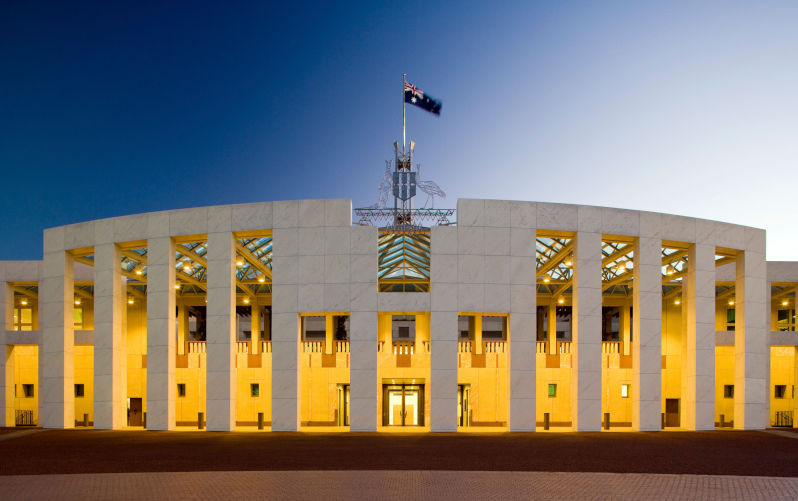This Russian victory really is one for the little guy
November 15, 2025
The Castle remains good law in Australia. Almost three decades since the battling suburban solicitor Dennis Denuto introduced us all to the high legal concept of “the vibe of the thing”, the High Court has broadly endorsed the classic movie’s basic contention: a man’s home is his castle.
And, our highest court says, that applies even if the home hasn’t been built yet and when the man is not cuddly Darryl Kerrigan of screen fame but the highly unfashionable litigant Vladimir Putin.
The case, in which the unanimous Full Court judgment was brought down on 12 November, was Government of the Russian Federation v Commonwealth of Australia [2025] HCA 44, which was previewed in Pearls on 10 August.
Russia was contesting the Australian Government action — by rapid-fire bipartisan legislation in June 2023 — to stop the Russians building their new embassy close to Parliament House, on a lease of land they had received back in 2008.
The reason for the blocking action was, Prime Minister Anthony Albanese said, because the government had received “very clear security advice as to the risk presented by a new Russian presence so close to Parliament House”. This advice was apparently not available at any point between the granting of the lease in December 2008 and the PM’s announcement in June 2023.
The mechanism was the Home Affairs Act 2023, announced, passed by both houses, assented to and operative within a day.
The court had to decide three big questions:
1: Was the Act invalid on the ground that it was not supported by a head of Commonwealth power?
2: If the answer to Question 1 was “no”, did the operation of the Act result in the acquisition of property from the plaintiff (Russia) to which s 51(xxxi) of the Constitution (the “just terms” provision) applied?
3: If the answer to Question 2 was “yes”, was the Commonwealth liable to pay to the plaintiff a reasonable amount of compensation?
Question 1, as tipped here in August, was answered in the negative, enlivening Questions 2 and 3 in exactly The Castle scenario; just replace the Kerrigan household under the Tullamarine flightpath with Putin’s planned embassy in leafy Yarralumla.
The answers to 2 and 3 were both “yes”, again as tipped here in August. Those tips were made broadly on the “vibe of the thing”, but of course the High Court expounded on the questions in great detail.
The Commonwealth, represented by Solicitor-General Dr Stephen Donaghue KC, advanced a very involved argument about why the Russians should get nothing, but Chief Justice Stephen Gageler AC and Justices Jacqueline Gleeson, Jayne Jagot and Robert Beech-Jones, in a joint judgment, said the Commonwealth argument involved “conceptual error” by stretching the constitutional conception of “just terms” as “fair dealing” beyond the true import of that description.
“Here, the means selected by the Commonwealth Parliament to protect Australia’s national security interests went no further than to terminate the lease and thereby to eliminate the risk perceived to arise from the continuing lawful occupation and use of the land by the Russian Federation …” their judgment said. “To provide just terms to the Russian Federation for the acquisition of its property in those circumstances is not an inconsistent or incongruous notion. To the contrary, it is what the Constitution requires.”
Justices Michelle Gordon AC and Simon Steward AC, in a separate judgment, said that “the identifiable benefit relating to the ownership or use of property which is taken from one person need not correspond precisely with that which is conferred on another, and the interest which is acquired must only be ‘an identifiable and measurable advantage of a proprietary nature’.”
The Russians had paid a once-only “land premium” of an identifiable and measurable $2.75 million for the site.
Justice James Edelman AC wrote his own judgment, perhaps the most intricate of the three, in which he raised the “anterior issue” of the relationship between the “just terms” provision of the Constitution and other heads of power in our founding document.
All three judgments are fascinating reads, if seriously involved.
But just like Denuto’s “vibe”, the bottom line was clear enough.
The government and Parliament had the power to stop the embassy being built on the site.
The Russians, like Kerrigan, were losing something.
The government should pay.
That’s how it’s done when you have a proper separation of powers.
A defendant, however unworthy generally in the eyes of the government, the Parliament and probably the overwhelmingly majority of the populace, wins if he has a fair case to put on the issue at hand.
We can only wonder how a similar case might have been decided in Trump’s United States, especially if the litigant were, say, China or Iran.
The views expressed in this article may or may not reflect those of Pearls and Irritations.


